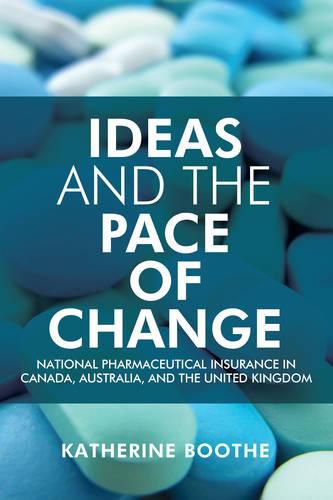Readings Newsletter
Become a Readings Member to make your shopping experience even easier.
Sign in or sign up for free!
You’re not far away from qualifying for FREE standard shipping within Australia
You’ve qualified for FREE standard shipping within Australia
The cart is loading…






Canada is the only OECD country that has universal, comprehensive public hospital and medical insurance but lacks equivalent pharmaceutical coverage. In Ideas and the Pace of Change, Katherine Boothe explains the reasons for this unique situation. Using archival, interview, and polling data, Boothe compares the policy histories of Canada, the United Kingdom, and Australia in order to understand why Canada followed a different path on pharmaceutical insurance.
Boothe argues that pace matters in policy change. Quick, radical change requires centralized political institutions, an elite consensus, and an engaged, attentive electorate. Without these prerequisites, states are far more likely to take a slower, incremental approach. But while rapid policy change reinforces the new consensus, incremental progress strengthens the status quo, letting development stall and raising the bar for achieving change.
An important contribution to the study of comparative political economy, Ideas and the Pace of Change should be required reading for anyone seeking to understand why health care reforms succeed or fail.
$9.00 standard shipping within Australia
FREE standard shipping within Australia for orders over $100.00
Express & International shipping calculated at checkout
Canada is the only OECD country that has universal, comprehensive public hospital and medical insurance but lacks equivalent pharmaceutical coverage. In Ideas and the Pace of Change, Katherine Boothe explains the reasons for this unique situation. Using archival, interview, and polling data, Boothe compares the policy histories of Canada, the United Kingdom, and Australia in order to understand why Canada followed a different path on pharmaceutical insurance.
Boothe argues that pace matters in policy change. Quick, radical change requires centralized political institutions, an elite consensus, and an engaged, attentive electorate. Without these prerequisites, states are far more likely to take a slower, incremental approach. But while rapid policy change reinforces the new consensus, incremental progress strengthens the status quo, letting development stall and raising the bar for achieving change.
An important contribution to the study of comparative political economy, Ideas and the Pace of Change should be required reading for anyone seeking to understand why health care reforms succeed or fail.